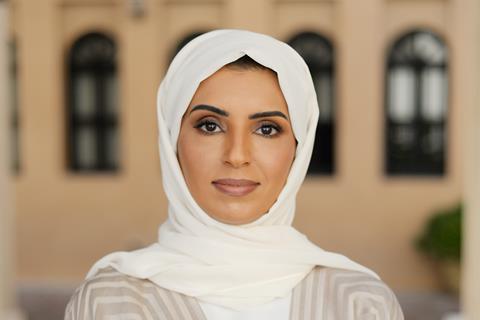
The inaugural Doha Film Festival (DFF) is a significant step forward for the Doha Film Institute (DFI), the nonprofit organisation established in 2010 to support the growth of the Qatari film community.
Nine days of screenings and events began with a three-day industry conference, at which several major developments for the country’s industry were announced, including a cash rebate of up to 50%.
Fatma Hassan Alremaihi, DFF festival director and DFI CEO, talks to Screen about the inspiration for the festival and why balancing respect with dialogue is key to its programming ethos.
When did you first have the idea of a Doha Film Festival?
The idea grew organically from 15 years of investing in film culture through DFI and marks the natural evolution of Qatar’s cinematic journey, honouring our rich cultural heritage while embracing the future of global storytelling. As our programmes expanded and our community matured, it was the right time to bring our initiatives together under one platform and share our stories with the world.
What did you learn from Qumra and Ajyal that you have taken into DFF?
Qumra taught us the power of intimate mentorship, rigorous curation, and project-focused training that move films from script to screen. Ajyal taught us how deeply audiences respond when you give them agency and trust. DFF brings lessons from both forward to pair artistic excellence with community-driven participation that deepens engagement.
The regional festival circuit is very busy at the end of the year. How do you hope DFF will stand out?
DFF stands out for our purpose and focus on cinema that challenges, heals and connects, especially across cultures in a divided world. Our programming is deeply curated, our industry activities contribute to the advancement of the broader regional ecosystem. Our unique strengths lie in our legacy of amplifying Arab voices and authentic storytelling.
Doha was attacked earlier this year by Israeli forces; how is the political situation now? Do you have protocols in place?
Qatar has a proven track record of maintaining the highest levels of safety and security, and we remain confident in our ability to provide a stable and comfortable environment for all our guests. Qatar has well-established protocols for major international events, and the well-being and security of our residents and visitors are of the highest priority to the country’s leadership.
Who has done what in setting up the festival? Who is in charge of the programme, talks, and Q&As?
The festival is a collective effort led by DFI’s programming team of filmmakers, curators and creative professionals who work together to ensure depth, diversity, and relevance in all our programmes. Their involvement ensures that the festival’s programming is as bold, curious, and globally connected as the audiences we aim to engage.
Who are your programmers, and what guidance did they receive?
The programming team at DFF is composed of talented young professionals who have grown and thrived within the Institute. They bring not only a deep understanding of cinema but also an infectious energy and forward-thinking perspective that reflect the spirit of a new generation. With a strong foundation in DFI’s values and a pulse on contemporary culture, they have curated a programme that is reflective, thought-provoking and resonates deeply with diverse audiences and sparks meaningful conversations.
Are there any topics or films you have to be cautious around? How do you handle local sensibilities?
We approach programming with respect, both for artistic freedom and our cultural context. Our guiding principle is to promote dialogue: presenting challenging films with thoughtful framing, conversations, and context so audiences can engage with them meaningfully.
Why did you choose The Voice Of Hind Rajab as the opening film?
Hind’s story is one the world must face. Opening with this DFI-backed film is to honour truth. Hind’s voice, trembling yet unyielding, speaks to every one of us. It is the story of all children, women, and men of Palestine whose lives have been shattered by violent aggression and whose resilience continues to inspire the global conscience. This powerful film demonstrates cinema’s unique role in amplifying voices that matter and the extraordinary efforts of the unsung heroes who tried to save an innocent child. By honouring Hind’s memory and that of countless others, we hope to awaken empathy, inspire justice, and remind the world that no story, however painful, should be left untold.
There is a wide range of speakers – from politics to music to activism. Why?
Cinema does not exist in isolation. It is shaped by politics, social movements, technology, and culture. Our speakers reflect that ecosystem, ensuring the festival becomes a space for ideas and dialogue. They represent diverse perspectives that align with the festival’s mission to encourage critical thought and open conversation.
What do you hope the local audience will gain from these speakers?
We hope to empower audiences to better understand the world. Providing a platform for diverse voices speaking truth to power – including those addressing difficult realities – is central to the role of art in society and to the mission of the Institute.















![[L-R]: Amanda Villavieja, Laia Casanovas, Yasmina Praderas](https://d1nslcd7m2225b.cloudfront.net/Pictures/274x183/6/4/1/1471641_pxl_20251224_103354743_618426_crop.jpg)








![[L-R]: Amanda Villavieja, Laia Casanovas, Yasmina Praderas](https://d1nslcd7m2225b.cloudfront.net/Pictures/100x67/6/4/1/1471641_pxl_20251224_103354743_618426_crop.jpg)
No comments yet